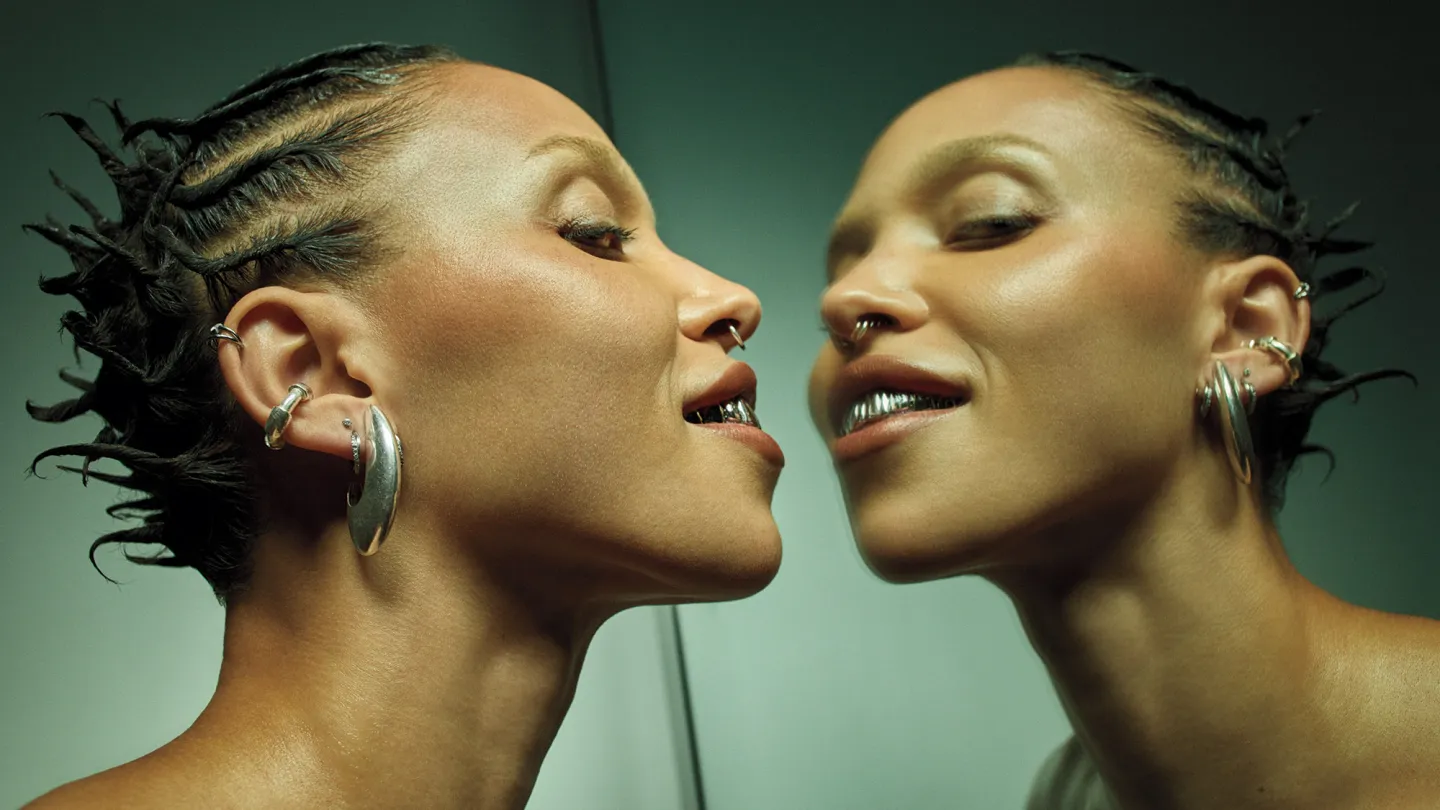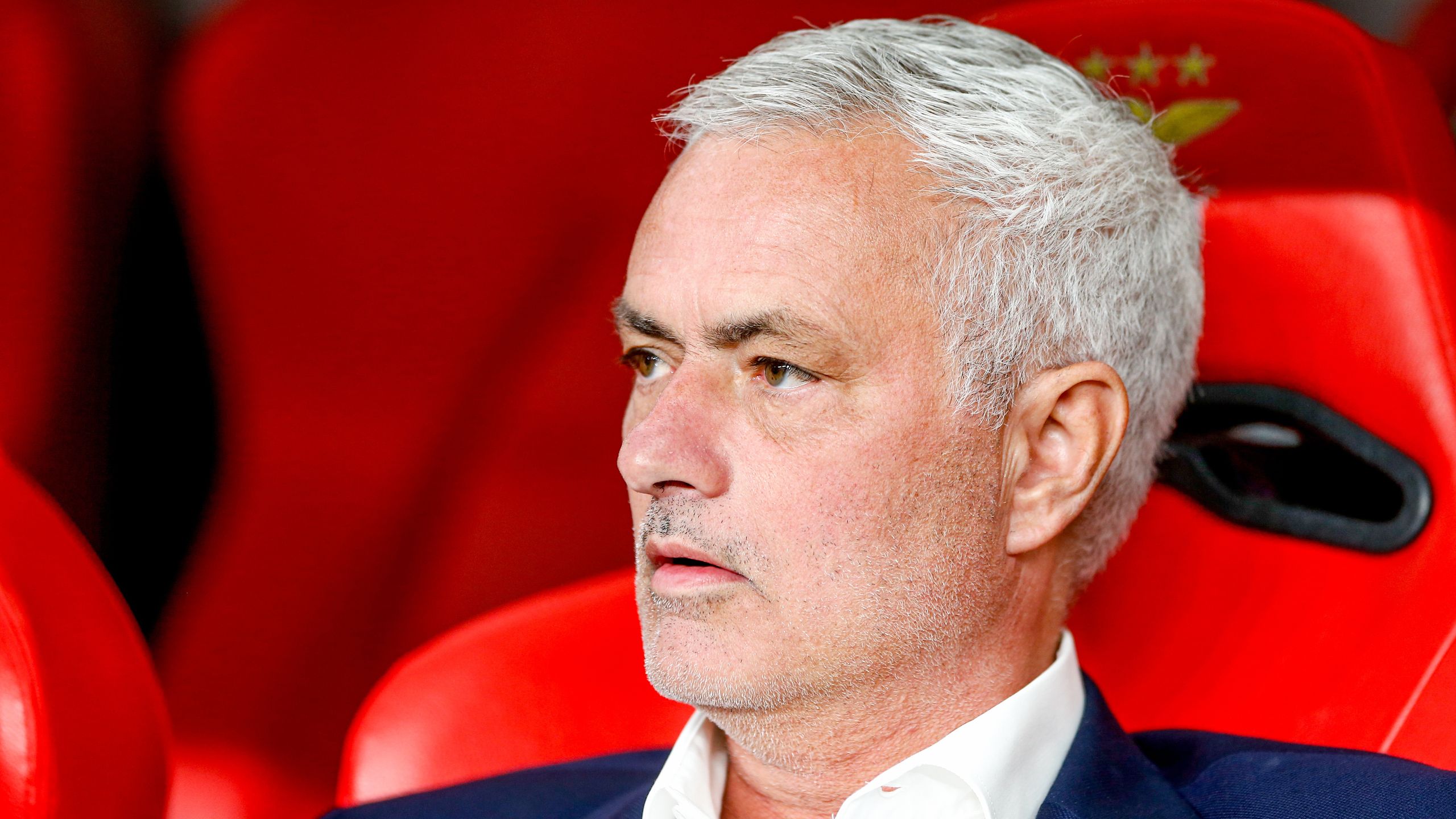
It wasn’t all that long ago — six months, to be exact — when things were looking pretty bleak for FKA Twigs. The British artist, long a critical darling for her hyper-expressive musical style — a blend of R&B and electronic and avant-garde pop — and provocative fashion and dance moves, had just released her first album in five years, Eusexua. The project’s rollout was a carefully curated and choreographed series of drops — teaser tracks (“Drums of Death,” “Perfect Stranger”) accompanied by eye-popping videos (“Childlike Things” featured Kim and Kanye spawn North West rapping in Japanese) — to culminate in a performance at Coachella in April and an elaborate tour. Three days before she was due to hit the stage in the Southern California desert, everything was scrapped. Twigs could not enter the U.S. because of visa issues.
“It was one of the most painful times of my career,” says the 37-year-old artist, whose real name is Tahliah Barnett. “Just the emotional and physical and financial ramifications that fell on FKA Twigs the business was catastrophic. All I wanted to do was perform in front of my fans — go to Mexico and do Coachella and tour America. The creative on that show was brilliant. We worked so hard on it … and it all slipped through my fingers like sand.”
Who dropped the ball or was responsible for the confluence of costly mistakes isn’t entirely clear. “It was so many small reasons why, but none were within my control,” Twigs says. “I was kept in the dark about how bad it all was. The flights and the visas and the stage advancing, none of it was done. And I don’t know how to do that because it’s not my job. But you know what? I’ve learned a lot.”
Indeed, Twigs today is fluent in all manner of touring, she says, boasting, “Now I know about buses and freighting; how many days it takes to get from New York to Mexico in a truck; how to get through customs.” She’s also decided to forgo having a music manager. “It’s something new that I’m trying. I have a small team around me, and none of them have a management title,” she says. Unaware that it’s the model employed by Taylor Swift, Twigs pauses, then remarks: “Well, it certainly works for her, doesn’t it?”
In fact, it’s working for Twigs, too. In September, Eusexua (pronounced yoo-sek-shoo-a) shortlisted for the U.K.’s prestigious Mercury Prize, and the Grammy buzz surrounding the album is only getting louder as voting kicks off Oct. 1.
The acclaim is understandable. Eusexua was conceived on the dance floor and delivers the euphoria of a club scene in its techno- and house-driven heyday. Picture a night in Ibiza where melodies provide the ecstasy and the instrument is Twigs’ multifaceted voice, defying register in shifting from a whispery soprano to guttural pulses in the most surprising of ways.
“Eusexua is a pinnacle of human experience — a feeling of pure nothingness but of endless possibility, like losing yourself on the dance floor for eight hours,” Twigs explains. “It’s the height of an orgasm, it’s losing yourself in a book. It’s being present whilst eating food, it’s even the hours that you lost as a child playing games. It’s a feeling of true presence in yourself — a constant state of everything and nothing all at once.”
Eusexua also is poised to be awards bait in a year when Swift is not competing, and saccharine pop doesn’t always impress the Grammys’ industry voters who choose nominees by committee. But do Grammys even matter to Twigs?
“When I was younger,” she concedes. “But less so now. I have never been in this for awards. … I’ve always felt very confident in my cultural impact more than what numbers look like on Spotify or how many trophies I have in my recording studio. I’ve consciously and actively done things so that I can be on the right side of myself as an artist. But in the same breath, I have been releasing music for two decades, and it would mean something to be recognized by other musicians and people who care a lot about music.”
Twigs has collaborated with a broad spectrum of artists, from rap heavies (Future, Ty Dolla $ign) to pop superstars (The Weeknd) and EDM giants (Fred Again, Skrillex), making her already difficult-to-categorize music even more challenging in the tricky genre races of the Grammys. “My place isn’t anywhere, to be honest,” she offers unapologetically. “I will be an artist that always changes styles to the glee and frustration of my fans.”
To be certain, little of Twigs’ career so far has been mainstream. The singer first broke out as part of an alternative R&B wave, but rather than stay in that lane, her music evolved to incorporate disparate styles — trip-hop, opera, club-ready grooves — while her imagery favored the strange and even unsettling over the hypersexualized beauty norms of her female peers. A dancer since the age of 12, choreography presents as performance art in Twigs’ world, where she consistently takes physical and visual risks — like a recent work of digital art in which she is pictured nude and pregnant on a stripper pole. (“I’m pregnant with my next project,” she explains of the forthcoming EUSEXUA Afterglow, out Nov. 14.)
Still, there are curious contradictions to Twigs. She’s railed against AI, going so far as to testify in front of the Senate in April 2024 about protections needed to safeguard artists (and regular people) from unauthorized digital replicas of themselves (she created a deepfake Twigs to exert some control of her likeness), but admits she’s never used ChatGPT and insists on making her digital-forward music with analog technology. “I left the computer years ago,” she says of music production.
One would think that Twigs would feel most comfortable in the dance arena, but even under the lights of a nightclub — like the one in Prague where Eusexua as a concept was birthed (“I’d been so stressed for so long and gone through so much, and had this moment on the dance floor where none of it burdened me and I realized I could get back to my purest sense of self”), there’s a struggle.
“I’m now entering my fourth decade of dancing for a living, and whenever I’m forced to dance, I’m really miserable,” Twigs says. “A lot of dancers feel this way — where [physically] you just don’t want to be a dancer anymore. It’s more about the movement. [On tour,] we’re not dancing, we’re creating movement as a pack.”
You could say the same of her acting roles. Since debuting in 2019’s Honey Boy, Twigs seems drawn to challenging characters within an ensemble. After a turn in 2024’s The Crow playing opposite Bill Skarsgard, she next appears in the indie The Carpenter’s Son, a biblical horror film starring Nicolas Cage, playing none other than Mother Mary.
“I love the family aspect of being involved in a film,” she says, praising Cage for being the “perfect collaborator” and observing “his old Hollywood star power” firsthand. “When he walks on set, you know that Nicolas Cage has arrived,” says Twigs. “But I never felt intimidated. He made me feel very welcome, and I learned so much from him.”
Even so, to take on one of the most famous women in history — and through a lens so bloody and violent — is a mighty tall order. “The Virgin Mary has been portrayed as a woman who is very agreeable — she’s a virgin, she’s sweet and she obeys. I personally didn’t feel that for my Virgin Mary,” says Twigs of her approach. “I felt like she’s somebody very powerful who doesn’t have to say a lot. I didn’t want to mistake her peacefulness for weakness. The peace within her, that we see so much in pictures and in scripture, came from the strength and knowledge and tenacity that she had to raise the savior. And that’s an incredible amount of pressure and responsibility.”
Twigs can relate. “When it’s my music, I’m Mother, and I make every single decision,” she says, contrasting the freedom she felt ceding control to director Lotfy Nathan. But after production, and back in her offscreen life, she went back into leader mode and looked after her crew of dancers — the same troupe whose 2025 plans got upended with the postponement of the tour — housing nine of them in her London pad while retooling the show.
“My back was against the wall, and I came out kicking,” she says of the pivot following the Coachella debacle. “I made a lot of music. I hunkered down, created and held people close to me. We lived together and danced and trained and brought the show back to life. … I felt like I was weathering a storm and I turned something really horrific into something positive.”
Twigs has some experience in this realm. In December 2020, she revealed publicly that a year-long romantic relationship with Honey Boy star and writer Shia LaBeouf had become abusive. Twigs sued LaBeouf for sexual battery, assault and infliction of emotional distress, alleging incidents of physical violence, including being strangled. She also described in the lawsuit a pattern of psychological manipulation in which LaBeouf exerted control over her daily life and kept her isolated from friends.
“What I went through with Shia was the worst thing I’ve ever been through in the whole of my life,” she told The New York Times at the time of the filing. “I don’t think people would ever think that it would happen to me. But I am not immune.”
Speaking of the abuse to Gayle King in 2021, Twigs shared, “It’s a miracle I came out alive,” adding, “People often ask, ‘Why didn’t you just leave?’ What people don’t realize is that it’s not one thing. It’s very subtle. It’s a very gradual step-by-step process to get somebody into a position where they lose themselves.”
The two settled privately in July, ahead of a scheduled trial date, for an undisclosed amount and released a joint statement that read: “We wish each other personal happiness, professional success and peace in the future.”
Asked whether she feels a sense of safety with the chapter behind her, Twigs answers, “No, I wouldn’t say I feel safe. I feel really passionate about being involved with organizations such as Sistah Space and No More, to help survivors in any way that I can. I think it’s less about me at this point and more about looking forward. Just, you know, moving on with my life.”
These days, that means performing in front of the biggest crowds she’s ever seen, bookending the summer with main-stage slots at Barcelona’s Primavera Festival and London’s All Points East, where she stepped in for Doechii and delivered a racy set that some British outlets described as “X-rated.” Coachella is back on the schedule, too, in what is sure to be a triumphant appearance in 2026.
Twigs’ focus is now on the fans who have waited years for her return. And having observed a sort of collective angst in crowds she’s performed for in the U.S. and Europe, community is top of mind. “Seeing people singing every single lyric— words I’ve made — it makes me quite emotional. It’s like they’re saying them back to me,” she says. “I wrote them at a time when I felt very scared — scared for myself, scared for my future as an artist, scared for my future as a human. I worry about community. Whether it’s women or the trans or queer communities or people of color, I have these huge thoughts that keep me awake at night.”
It all comes back to Eusexua and the idea that there are places “where we can be together,” she says. In other words, communing. “It sounds so obvious, finding salvation within dance music and a sense of community,” says Twigs. “But there are times in my life where I am in this fearful place, and it doesn’t feel obvious at all that I could belong to something bigger than myself. Every single person has had a moment where they’ve probably sat by themselves and thought, ‘What does this mean? Where do I belong? Like, who am I?’ And to have a moment, an evening’s reprise from that, among a group of like-minded people, could be the difference of life and death.”
***
Read more from THR’s Music Issue



